Tomato potato psyllid
Holiday operating period
During the Christmas and New Year period we will be operating at reduced capacity, and response times may be slower than usual while our teams take a well deserved break. We will continue to monitor enquiries and process requests as capacity allows.
Respectful behaviour
Abusive or aggressive behaviour towards staff will not be tolerated under any circumstances. We appreciate your patience and respectful communication.
Information for businesses
All Victorian businesses transporting tomato potato psyllid (TPP) host or carrier plants or produce interstate from 8 December 2025 will need to comply with entry requirements set by each destination jurisdiction. These requirements vary by state and differ for host and carrier commodities of TPP.
- Biosecurity Update – Advanced notification of the release of PS-66: Pest Free Production Site for Tomato-Potato Psyllid – 24 December 2025
 [PDF File - 360.7 KB]
[PDF File - 360.7 KB] - Factsheet: How to Gain Accreditation as a Pest Free Production Site for Tomato Potato Psyllid (TPP) – 24 December 2025 (accompanies biosecurity update above of the same date)
 [PDF File - 952.1 KB]
[PDF File - 952.1 KB] - Biosecurity Update – Market access arrangements for the treatment or inspection or secure packing of carrier nursery stock for Tomato-Potato Psyllid (TPP) (NSW and SA) – 19 December 2025
 [PDF File - 303.2 KB]
[PDF File - 303.2 KB] - Biosecurity Update – PS–60: inspection of carrier produce for Tomato potato psyllid (TPP) – updated to include Tasmania – 19 December 2025
 [PDF File - 312.2 KB]
[PDF File - 312.2 KB] - Biosecurity Update – Inspection of TPP host tubers, carrier produce and dormant nursery stock for freedom of green material - 12 December 2025
 [PDF File - 266.4 KB]
[PDF File - 266.4 KB] - Biosecurity Update – revised interstate quarantine requirements for TPP - 12 December 2025
 [PDF File - 234.4 KB]
[PDF File - 234.4 KB] - Biosecurity Update – TPP – supermarkets – 8 December 2025
 [PDF File - 372.4 KB]
[PDF File - 372.4 KB] - Biosecurity Update – TPP – ICA-04- Fumigation with methyl bromide – 8 December 2025
 [PDF File - 291.5 KB]
[PDF File - 291.5 KB] - Biosecurity Update – TPP – ICA–55 – Irradiation treatment – 8 December 2025
 [PDF File - 291.7 KB]
[PDF File - 291.7 KB] - Biosecurity Update – TPP – ICA–61 – updates to packhouse washing and inspection – 8 December 2025
 [PDF File - 290.0 KB]
[PDF File - 290.0 KB] - Biosecurity Update – TPP – ICA–60 and PS–60 market access arrangements for strawberry fruit – 8 December 2025
 [PDF File - 287.7 KB]
[PDF File - 287.7 KB] - Biosecurity Update – TPP – PS–57 and PS–58 – 8 December 2025
 [PDF File - 293.2 KB]
[PDF File - 293.2 KB] - Biosecurity Update – TPP interstate quarantine requirements – 8 December 2025
 [PDF File - 229.2 KB]
[PDF File - 229.2 KB] - Biosecurity Update – Market access changes for interstate trade of Tomato Potato Psyllid host produce and host nursery stock – 28 November 2025
 [PDF File - 383.5 KB]
[PDF File - 383.5 KB] - Biosecurity Update – Market access changes for interstate fruit and vegetable trade – 21 November 2025
 [PDF File - 349.2 KB]
[PDF File - 349.2 KB] - Biosecurity Update – Market access requirements for Tomato Potato Psyllid (TPP) – 7 November 2025
 [PDF File - 269.0 KB]
[PDF File - 269.0 KB] - Biosecurity update – Tomato Potato Psyllid – 30 September 2025
Response to TPP detection in Victoria
Tomato potato psyllid (Bactericera cockerelli, Figure 1) was first detected in Victoria in November 2024. This was the first detection in Australia outside Western Australia. The initial detection occurred on the Bellarine Peninsula, where a restricted area was established to help contain the pest. In October 2025, TPP was detected outside the restricted area in Melbourne’s northern suburbs. This indicated that the pest may be present beyond the previously identified area.
TPP attacks host plants such as tomato, potato, chilli and capsicum. It can also carry a serious exotic bacteria known as Candidatus Liberibacter solanacearum (CLso), which can cause zebra chip disease in potatoes. CLso has not been detected in Australia. Ongoing surveillance and testing will continue to confirm Victoria’s freedom from CLso.
- Hosts include plants and plant products from the Solanaceae and Convolvulaceae families. This includes fresh fruit and vegetables such as tomatoes, potatoes and capsicum, as well as ornamental plants, such as petunias and ornamental chilli.
TPP can also be transported on other species of plants even though it does not feed on them. These ‘carrier’ plants are also regulated when moving interstate, with the specific definition of ‘carrier’ varying between jurisdictions.
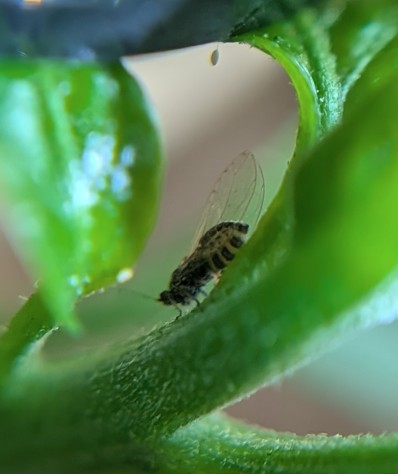
About TPP
The tomato potato psyllid is a tiny sap-sucking insect that goes through 3 stages of development:
- Egg
- Nymph (juvenile)
- Adult
Psyllid eggs are yellow, oblong-shaped and 0.3 mm long. They are laid on the end of a short stalk on the lower surface of leaves and on leaf margins (Figures 2 and 3).
Nymphs moult 5 times, growing in size from 0.2 mm to 2 mm. Nymphs have flattened oval, pale yellow to green or orange scale-like bodies and red eyes. More mature nymphs have wing buds and are fringed with hairs. Nymphs prefer sheltered locations and are predominantly found on the underside of leaves (Figures 4 and 5).
Adults resemble small, winged cicadas and are about 3 mm long with transparent wings held tent-like over their body (Figures 1 and 6). When new moulted, their body is yellow but turns brown soon after. They have a broad white stripe on the first abdominal segment and an inverted V-shaped band on the last abdominal segment.
TPP can spread through the movement of plants and plant materials, including fruit, vegetables and nursery stock, and on horticultural machinery and equipment. The psyllid can also fly short distances or be carried longer distances by wind.
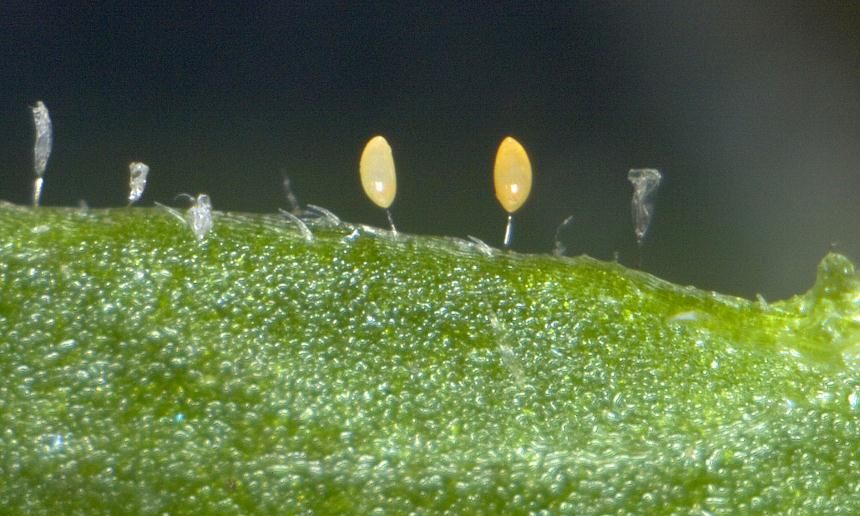

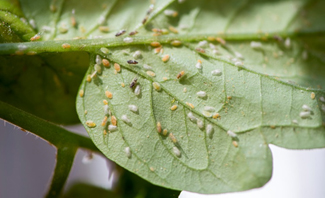
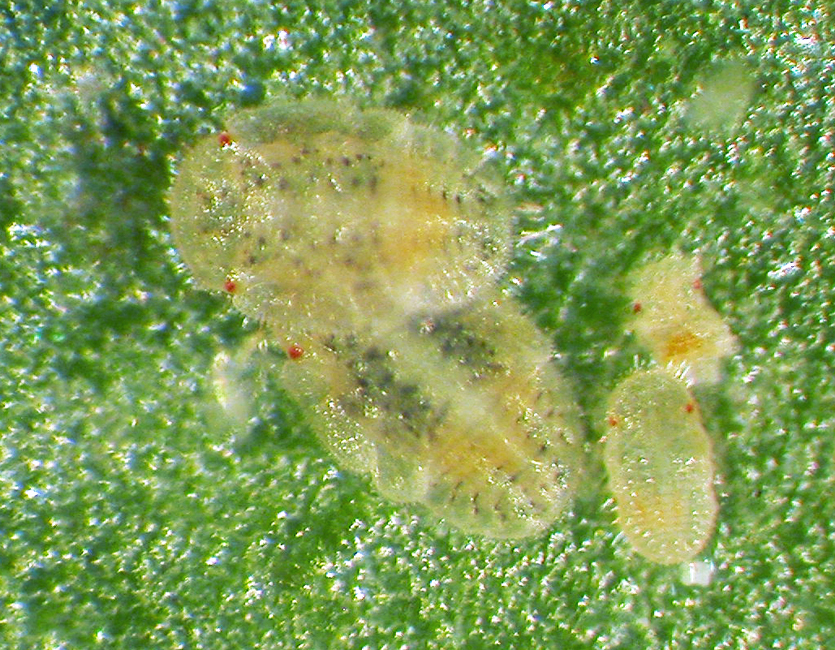
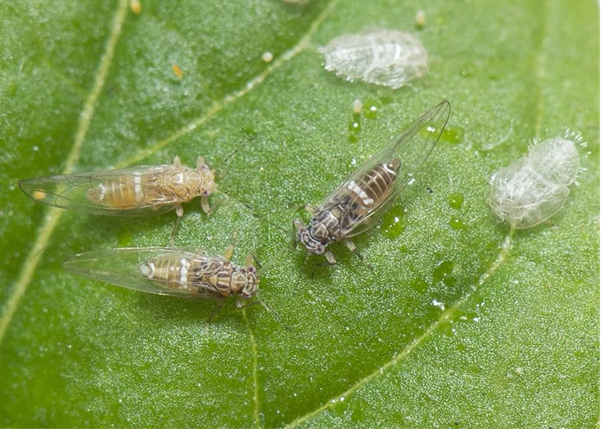
Signs of TPP
TPP are often referred to as ‘jumping plant lice’, as the adults readily jump and fly off when foliage is disturbed.
An infestation of TPP can cause ‘psyllid yellows’, which includes the following symptoms:
- Stunted growth
- Severe wilting
- Yellowing of the leaves (Figure 7)
- Upward curling or cupping of leaves (Figure 8)
- Shortened stem internodes
- Reduction in yield and quality
Nymphs and adult produce large quantities of white, sticky, sugar-like granules (‘psyllid sugars’) as a by-product of feeding. This sticks to the foliage, coating the leaves and stems and can lead to the development of sooty mould, making the plant look dirty (Figure 9). Stunted growth, shortened stem internodes and stem death can resemble other potato and tomato disorders. Early detection is essential to minimise damage.
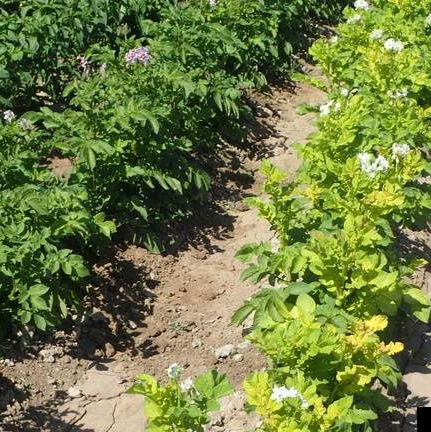
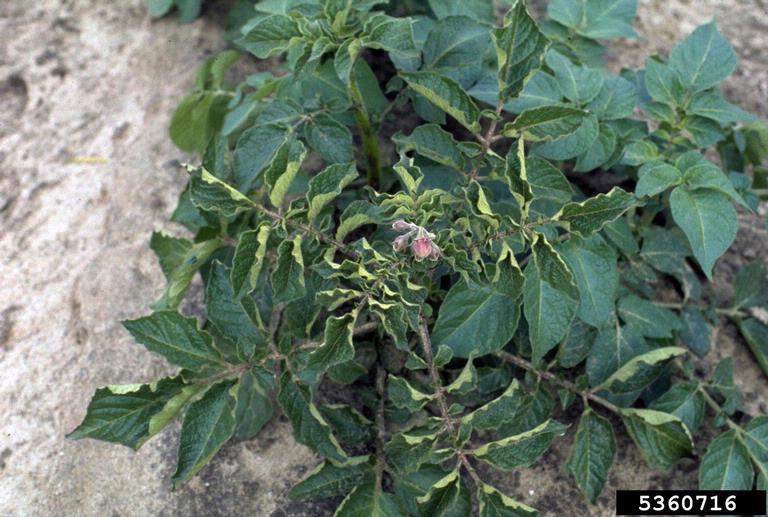
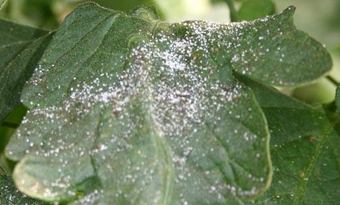
Reporting an unusual plant insect pest or disease
Report any unusual plant pest or disease immediately using our online reporting form or by calling the Exotic Plant Pest Hotline on 1800 084 881. Early reporting increases the chance of effective control and eradication.
Please take multiple good quality photos of the pests or damage to include in your report where possible, as this is essential for rapid pest and disease diagnosis and response.
Your report will be responded to by an experienced staff member, who may seek more information about the detection and explain next steps.
Report onlinePhoto credits
- Figures 1 and 3: Ashley De Vries
- Figure 2: Plant and Food Research, New Zealand
- Figures 4, 6 and 9: Department of Primary Industries and Regional Development (DPIRD), Western Australia.
- Figure 5: Joseph Munyaneza, USDA, ARS, bugwood.org.
- Figure 7: Whitney Cranshaw, Colorado State University, bugwood.org
- Figure 8: Eugene E Nelson, bugwood.org